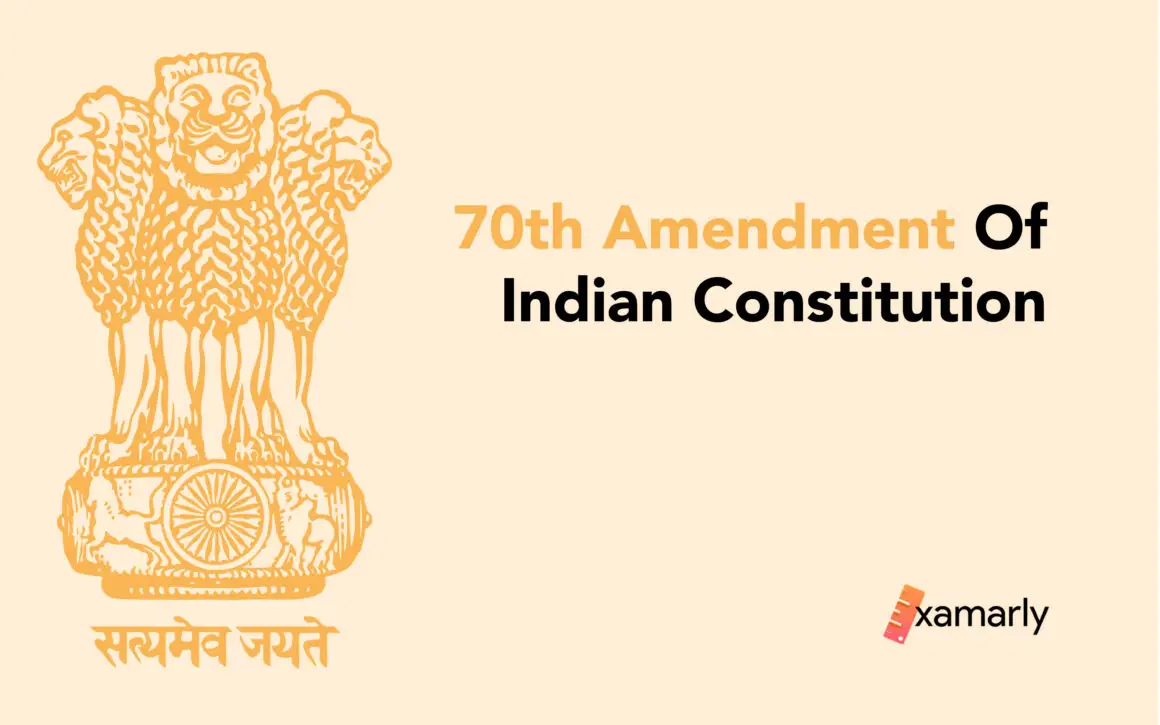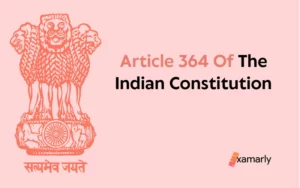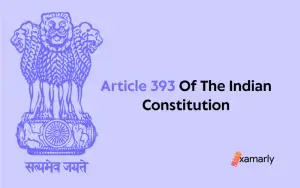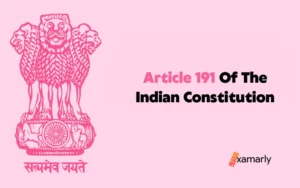The Constitution (Seventieth Amendment) Act, 1992 is the formal name of India’s 70th Amendment to the Constitution. With this modification, the Electoral College for the presidential election will now include the National Capital Territory of Delhi and the Union Territory of Pondicherry.
Read this article to get in-depth knowledge about the 70th amendment of the Indian constitution. For UPSC candidates preparing for the IAS Exam, this information is helpful.
70th Amendment of the Indian Constitution
On 21 December 1991, the 70th amendment of the Indian Constitution came into effect. This constitutional modification was enacted in the Forty-third year of the Republic of India.
The Pondicherry Legislative Assembly’s elected members were incorporated into the electoral college for the President of India by the 70th constitutional amendment.
Main Points
Prior to the Constitution’s 70th Amendment Act of 1992:
- Regarding the election of the President, Article 54 established an electoral college made up only of the elected members of the Parliament and state legislative bodies. Union Territories were excluded from it.
- The Pondicherry and Delhi legislators are included as a result of this modification.
- As a result, the Union Territories’ members took part in the 1992 Indian presidential election for the first time.
Statement of Objects and Reasons
Both Houses of Parliament heard arguments for the Constitution (Seventy-fourth Amendment) Bill of 1991 and the Government of National Capital Territory Bill of 1991.
These opinions supported adding elected representatives from Union territory Legislative Assemblies to the electoral college for the presidential election under Article 54 of the Constitution.
Prior to the 70th amendment Article 54 concerning the election of the President establishes an electoral college consisting only of elected members of Parliament and the state legislatures. Union Territories were not included in it. Similarly, Legislative Assemblies of States are mentioned in Article 55, which outlines the procedure for such elections.
As a result, it is requested that article 54 be amended to include an explanation. This was done to ensure that the National Capital Territory of Delhi and the Union territory of Pondicherry would be included when the term “State” was used in articles 54 and 55 to determine the composition of the electoral college for the election of the President.
By doing this, it would be possible to include in the electoral college both the elected members of the proposed Legislative Assembly of the National Capital Territory of Delhi under Article 239AA and the members of the Legislative Assembly formed for the Union territory of Pondicherry under the provisions of article 239A.
On December 21, 1991, the President gave his approval to The Constitution (Seventy-fourth Amendment) Bill, 1991. This later evolved into the Constitution (Sixty-ninth Amendment) Act, 1991. The mentioned Bill initially attempted to add subclause (b) to clause (7) in article 239AA.
The inclusion of the abovementioned sub-clause would have required the Bill to be ratified by the Legislatures of at least half of the States, which would have delayed the early creation of a Legislative Assembly for the Union territory of Delhi.
It modifies the present Constitution (Amendment) Bill. This was done to include clause 3 of the current bill with retroactive effect, or as of December 21, 1991. Along with obtaining ratification for the other provision of the Bill, which aims to change article 54, ratification by States is also recommended for this section.
The intention of the Bill is to implement the aforementioned ideas.
Important Provisionss
Amendment of article 54– The following explanation must be included at the end of Article 54 of the Constitution:
“State” under this article and article 55 refers to both the Union territory of Pondicherry and the National Capital Territory of Delhi.
Amendment of article 239AA.- In article 239AA of the Constitution,-
(i) Replace the brackets, figure, and letter “(7)” in clause (7) with the brackets, figure, and the letter “(7) (a)”;
(ii)The following sub-clause shall be introduced in clause (7), as amended, namely:-
Regardless of the fact that it contains a provision that alters or has the effect of altering this Constitution, a statute referred to in subclause (a) is not deemed to be a change to the Constitution for the objectives of article 368.
Conclusion
The 70th Amendment of the Indian Constitution went into effect on 21 December 1991. Before this act was passed, Article 54 regarding the election of the President called for an electoral college made up only of the elected members of Parliament and the State legislative assemblies.
Members of the Delhi and Pondicherry legislatures are to be included, according to the amendment.
In the interest of further readings:
| Important Amendments Of The Indian Constitution | Schedules Of The Indian Constitution |
| Tricks To Remember Amendments Of The Indian Constitution | Amendment Of Indian Constitution and Basic Structure Theory |
FAQs
The elected Pondicherry legislative assembly members were incorporated into the Indian President’s electoral college by what constitutional amendment?
70th amendment of the Indian Constitution incorporated the elected members of the Pondicherry Legislative Assembly into the President’s Electoral College.
When 70th amendment of the Indian Constitution enacted?
Parliament enacted the Seventieth amendment of the Indian Constitution in the 43rd year of the Republic of India.






